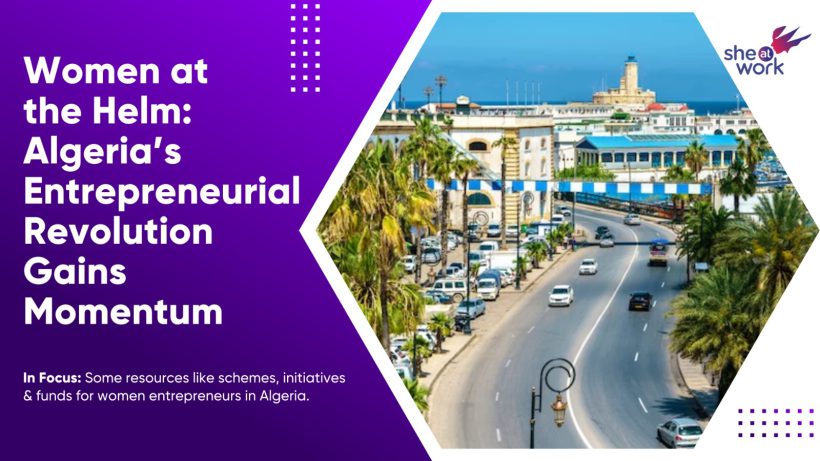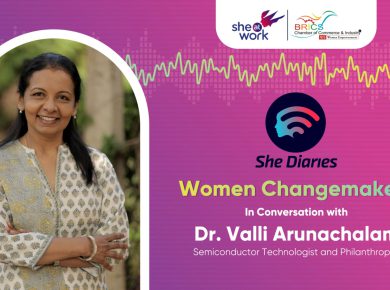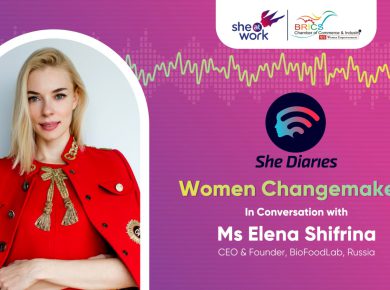In Focus: Some resources like schemes, initiatives & funds for women entrepreneurs in Algeria
#AlgeriaStartupScene #WomenWithVision #LeadLikeHer #NorthAfricaBiz #RiseOfWomenFounders
Algeria is known as “Al-Jaza’ir” in Arabic, which means “The Islands” or “The Peninsula”. And a quiet revolution is underway cross Algeria – one led by women who are challenging norms, innovating boldly & building thriving businesses. Women entrepreneurs in Algeria are emerging as key drivers of economic growth, job creation, & social transformation. While cultural expectations and systemic barriers persist, increasing numbers of Algerian women are stepping confidently into the entrepreneurial arena – turning passion into purpose & ideas into impact.
The Rise and Resilience of Women Entrepreneurs in Algeria
From bustling cities to rural communities, women-led ventures are making their mark across sectors like – agriculture, technology, e-commerce, fashion & manufacturing. Their journeys, however, are not without hurdles – from limited access to finance and mentorship to regulatory obstacles and persistent gender biases. But a growing ecosystem of support is rising to meet these challenges.
Government programs, international development initiatives, and grassroots networks are all working to empower women with the tools, training, and resources needed to succeed. These efforts are helping to pave the way for a more inclusive economy – one where Algerian women not just participate, but lead too. As momentum builds, the future of women’s entrepreneurship in Algeria looks increasingly bright, marked by resilience, innovation & the power of community.
Here are some resources like initiatives, schemes and funds for women entrepreneurs in Algeria.
- Algerian Constitution of March 2016
In Algeria, the modification of the Algerian Constitution of March 2016 introduced article 36: “The State works to promote parity between men and women in the job market. The State encourages the promotion of women to responsibilities in public institutions and administrations as well as at the corporate level”.
Interestingly, this statement outlines the recognition of the role of women in Algeria and, all of their rights are enshrined through the legislative and regulatory system which integrates them as full players in the process of economic and social development by guaranteeing the principles of equality and non-discrimination between women and men. These rights are guaranteed primarily by the Constitution (articles 37, 40).
The right to access to employment is reinforced by – Law 90-11 of August 21, 1990 on labour relations, where articles 17 and 142 protect working women from all forms of discrimination in matters of pay and conditions of work – thus ensuring her the right to a salary equal to that of a man. Likewise, under the law, the Algerian woman has the right to have her own property, to manage it personally and to have control over it (article 674 of the civil code). So, Algeria has always worked for the promotion and empowerment of women. In this sense, measures have been taken by setting up a job creation and entrepreneurship system.
National Microcredit Management Agency (ANGEM)
The desire of Algerian women to start a business was materialized too – according to statistics, between 2019 and 2021, 64% of credits from the National Microcredit Management Agency (ANGEM) were granted to women. In addition to having acquired a status in society, this demonstrates the good reception and acceptability of Algerian society towards women as business leaders & entrepreneurs.
In terms of women’s participation in political life, Algerian law guarantees the principle of gender parity. Despite its presence in elected bodies and in government, results still fall short of women’s aspirations.
Algeria participates in the Interreg NEXT MED Programme. This is something new added. What are your expectations as National Contact Point regarding the participation of Algerian entities in future NEXT MED projects related to women?
The Interreg NEXT MED is an opportunity for Algerian entities to share with Mediterranean partners their know-how and skills to achieve the objectives and priorities set by the programme, within the framework of joint actions and initiatives. Hopefully, these initiatives would be built by involving women as project leaders & also as beneficiaries of the project results.
Interreg NEXT MED was organized in Algiers on the 8th of February 2024.
- Promoting female entrepreneurship in Algeria’s green economy (PEFEVA)
Algeria not only has significant natural resources at its disposal, including oil, gas and a wealth of fauna and flora, but it also holds great potential for the socio-economic development of women. This opens up new opportunities for the country’s transition to a ‘green’ economy.
Women only make up around 17.4 per cent of economic actors. More women in the business world would support the Algerian Government’s strategy – for diversifying the economy. There are many benefits here. It would also improve the low employment rate and eliminate income disparities. And, in order for women to start and expand their business activities, they need access to needs-based support and financial services.
Women entrepreneurs in the green economy benefit from a demand-driven entrepreneurial ecosystem in Algeria.
The project develops the entrepreneurial ecosystem in Algeria – by expanding services that are better tailored to the needs of women entrepreneurs in the green economy. The focus is on – improving the rights, resources and representation of women entrepreneurs by taking a transformative approach. To this end, the project promotes the knowledge and skills of private and public actors, especially central and local institutions, women’s associations and incubators – making it possible for them to offer their support services to female entrepreneurs in a more targeted manner.
In cooperation with women entrepreneurs, the project is also expanding services aimed at strengthening competitiveness and innovative capacity. The focus is – on value chains for the production and marketing of natural cosmetics and products made from valuable raw materials. Through activities aimed at promotion and communication, the project improves awareness of women entrepreneurship.
https://www.giz.de/en/worldwide/150945.html
- Algeria Start-up Fund (ASF)
ASF creation (Algeria Start-up Fund) ASF (Algeria Start-up Fund) happens to be the first public fund dedicated to start-up, endowed with a capital of 1.2 billion DA to support project creators. Created during the first national conference of star-up “Algeria Disrupt 2020”, held in early October 2020 in Algiers, entrepreneurs and start-ups can present their projects to the ASF and benefit from financial support for their implementation.
So, Algeria has put in place initiatives – to promote female entrepreneurship and encourage women to create their own businesses. Training, mentoring and access to financing programs are also in place – to support women entrepreneurs. Incubators, also coworking spaces are created to promote the exchange of ideas and the development of professional networks.
https://hal.science/hal-04510952v1/document
- ‘InspireHer’ Initiative
Tracing the origins, the Union for the Mediterranean (UfM), in strategic partnership with the Union of Arab Banks (UAB), launched – “InspireHer: Transforming Financial Access and Entrepreneurship in the MENA Region” – an initiative aimed at removing blockages to financial inclusion faced by women across nine countries in the MENA region – including Lebanon, Jordan, Egypt, Palestine, Mauritania, Algeria, Morocco, Tunisia, and Libya.
Women entrepreneurs at various stages of their journey are encouraged to apply one of following three categories.
– The New Venture Category is designed for early-stage entrepreneurs with innovative ideas aimed at overcoming financial barriers or promoting women’s economic empowerment, and for projects in the 0–2 year stage.
– The Established Business Category welcomes applications from founders or CEOs who have successfully developed start-ups or SMEs and are looking to expand their businesses.
– Lastly, the Women Entrepreneur of the Year 2025 Award is open to influential women entrepreneurs who have made significant impacts in their fields, irrespective of their participation in other categories.
Prizes across the categories range from $1,500 to $3,000. Winners and finalists will also benefit from being featured in articles within UAB’s official magazine. Thus, they gaining visibility across regional platforms, get involved in tailored capacity-building workshops provided by UNIDO, and also have the opportunity to participate in the World Entrepreneurs Investment Forum 2026, which would connect them with global investors and decision-makers.
An InspireHer award ceremony will be held during the UfM Women Business Forum, scheduled to take place in Palermo, Italy, on 16–17 July 2025. The event will centre around enhancing women’s access to finance in business, aligning with broader regional efforts to translate recognition into actionable policies promoting women’s entrepreneurial growth.
NOTE: Applications open on 24 March 2025, with a submission deadline of 24 April 2025. Finalists will be announced in June 2025, leading up to the award ceremony on 16 July 2025
https://ufmsecretariat.org/inspireher-contest-2025/
- AFAWA (Affirmative Finance Action for Women in Africa)
AFAWA (Affirmative Finance Action for Women in Africa) is a pan-African initiative to bridge the $42 billion financing gap that women face in Africa.
Why AFAWA? What are the benefits? There are many like –
- Because women are the backbone of the African economy. The African continent has the highest percentage of women entrepreneurs in the world. According to the Global Entrepreneurship Monitor (GEM) 2016/17 Women’s Report, the female entrepreneurship rate in sub-Saharan Africa is 25.9% of the female adult population, meaning that one in four women starts or manages a business.
- Because women typically reinvest up to 90% of their income in the education, health and nutrition of their family and community – compared to up to 40% for men. This means that investing in women’s businesses can transform societies.
- Because women entrepreneurs face multiple challenges to access finance, withan estimated $42 billion financing gap for African women across business value chains, including $15.6 billion in agriculture alone. The challenges include:
- Finance: lending to women is seen as riskier, so they face prohibitive interest rates. In addition, women often lack traditional collateral and guarantees.
- Capacity: financial institutions lack the capacity to understand and respond appropriately to women entrepreneurs, who also often lack the financial and business acumen to respond to the needs of financial institutions.
- Business environment: in many countries, legal and regulatory frameworks hinder women’s full participation in private sector growth.
AFAWA’s approach challenges the gender gap in access to finance and liberates women’s entrepreneurial capacity in Africa.
- ‘Enhancing Women Entrepreneurs’ Financial Inclusion & Access to Finance in the Digital Age’ Project
The EU-OECD project which drives women’s economic empowerment in the Southern Mediterranean covers countries like – Algeria, Egypt, Jordon, Lebanon, Libya, Morocco, Palestine, Tunisia. The project – “Enhancing Women Entrepreneurs’ Financial Inclusion and Access to Finance in the Digital Age” aims to boost women’s economic empowerment by promoting an enabling policy and regulatory framework for women’s financial inclusion and access to finance, notably for women entrepreneurs. The project engages policy-makers, financial institutions as well as women entrepreneurs’ networks, fostering multi-stakeholders dialogue and peer-exchanges for policy and regulatory reforms. The project duration is: 2024 – 2027.
The objective of the project is – to promote an enabling policy and regulatory framework for women entrepreneurs’ financial inclusion and access to finance.
This will be achieved through:
• Enhanced awareness and engagement of policy makers and financial institutions through regional multi-stakeholder policy dialogues;
• Strengthened capacities of policy-makers, financial institutions and women entrepreneurs’ networks to develop sound policies and strategies;
• Policy recommendations and guidance for their implementation – based on identified action gaps and good practices.
The EU-OECD project addresses policy and regulatory gaps in women’s access to finance and financial inclusion in the Southern Neighbourhood region. It focuses on key policy and regulatory aspects of women entrepreneurs’ financial inclusion such as: access to finance programmes for entrepreneurs and SMEs, legal and regulatory frameworks for entrepreneurship financing, financial literacy policies, financial consumer protection frameworks, and other types of public support for women entrepreneurs. It also takes into account the opportunities and challenges of digitalisation for financial inclusion.
- Association Migration Solidarité et Échanges pour le Développement (AMSED)
The Association Migration Solidarité et Échanges pour le Développement (AMSED) works to improve the economic situation of women in rural communities in Tizi-Ouzou in the Kabylie region of Algeria – through diaspora skills transfer to develop agricultural and apiculture skills, and provide them with the tools required to develop and maintain their livelihoods. It encourages ecological projects, in particular recycling of clothing and beekeeping, in order to preserve the environment.
https://diasporafordevelopment.eu/cpt_practices/support-for-rural-women-entrepreneurs-in-algeria/
- MENA Progams
IFC’s MENA (Middle East and North Africa) programs, including the MENA Women Banking Champions program, are still active in Algeria, focusing on expanding access to finance and boosting financial inclusion, especially for women entrepreneurs.
Looking at the background, The International Finance Corporation (IFC), a member of the World Bank Group, plays a significant role in supporting private sector development and promoting sustainable growth in the MENA region, including Algeria. In 2020, IFC launched its MENA Women Banking Champions program in the Maghreb region (Morocco, Tunisia, and Algeria) – to help expand access to finance and boost financial inclusion for women entrepreneurs.
IFC’s work in Algeria, as part of the broader MENA strategy, focuses on:
- Economic Diversification: Supporting the diversification of the Algerian economy beyond hydrocarbons.
- Public Finance Reforms: Helping the government optimize budgetary resources and diversify state revenue sources.
- Energy Transition: Supporting the transition towards a cleaner energy mix and improved energy efficiency.
- Climate Change Adaptation: Addressing climate change challenges, including disaster risk management and sustainable forest management.










